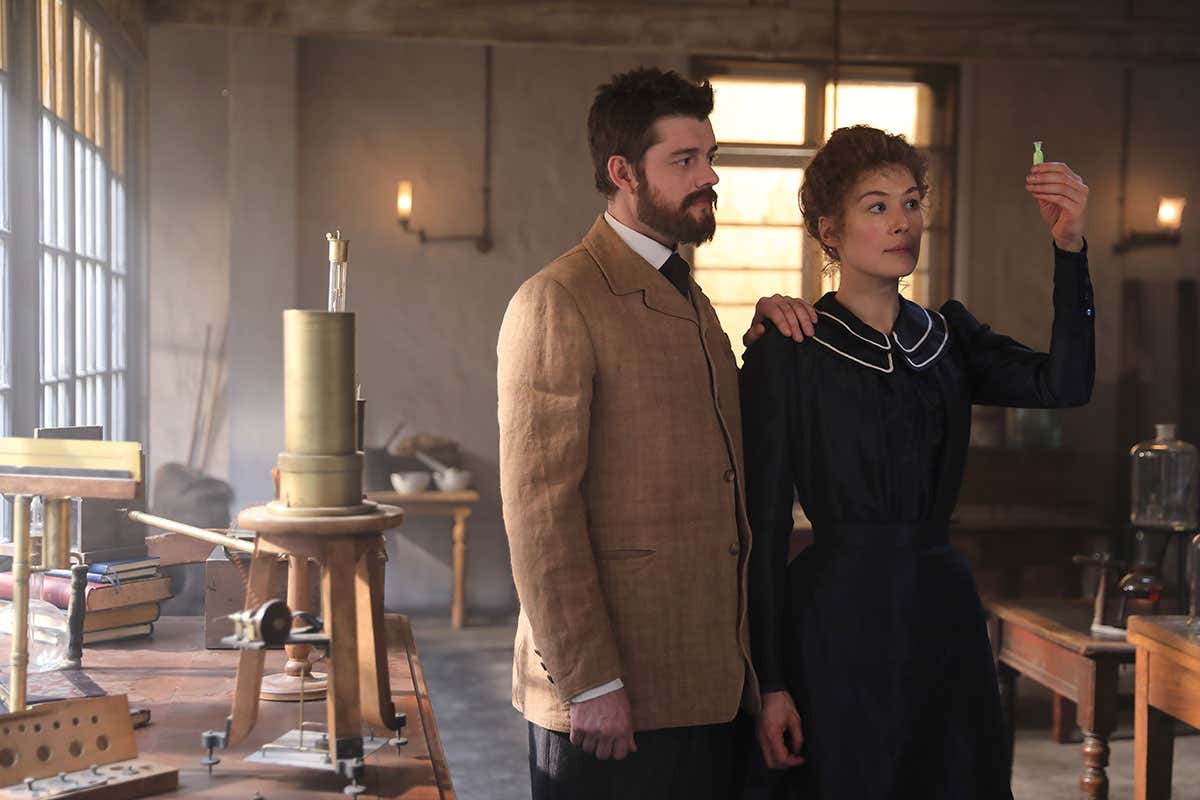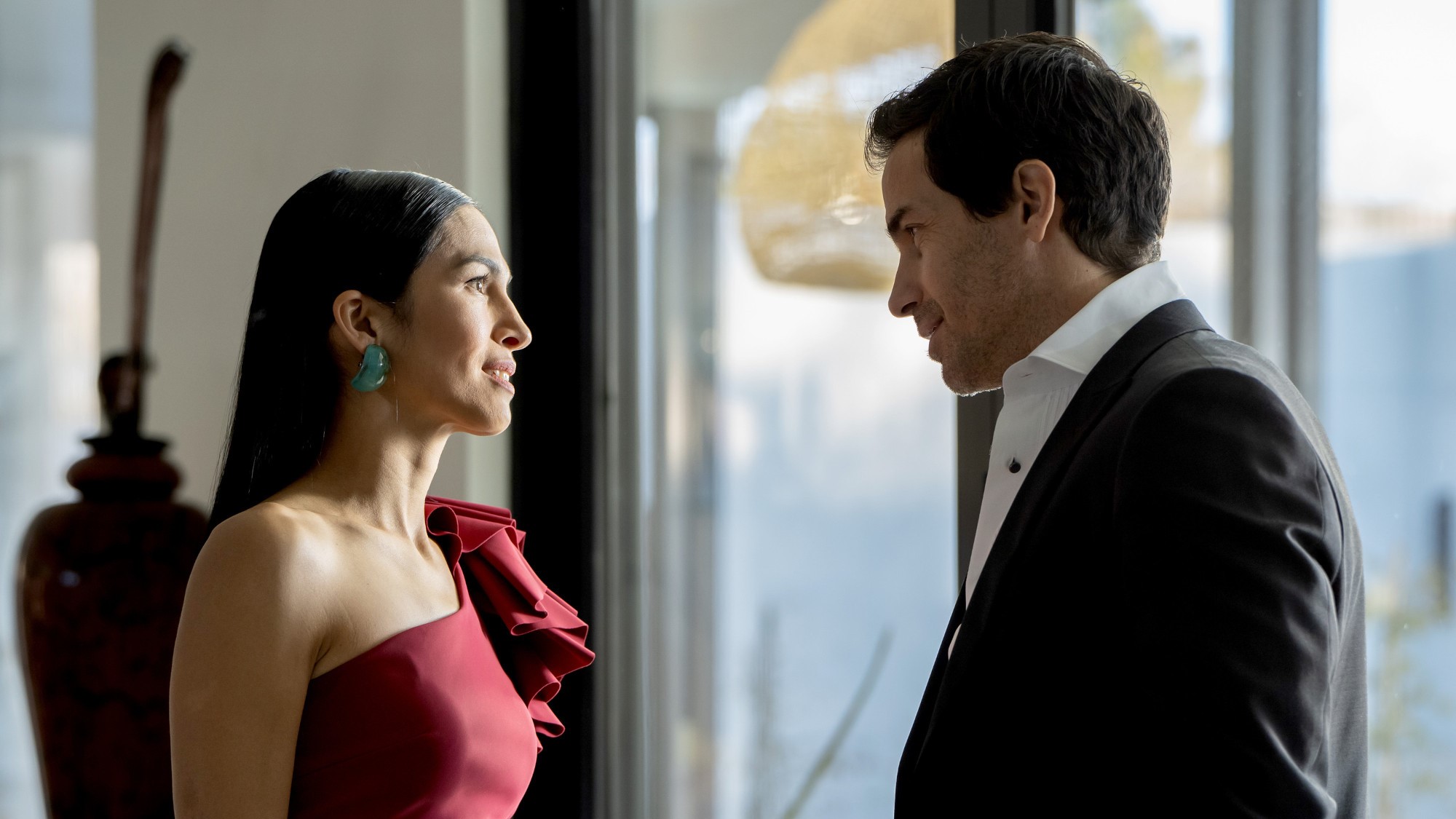What to Watch Verdict
A capable, humanizing, and often lovely look at one of the greatest scientific minds in history.
Pros
- +
A good use of color.
- +
Tackles themes like sexism, nationalism, and female sexuality.
- +
A great (and tragic) love story.
- +
Cleverly flashes forward to highlight Curie's impact.
Cons
- -
Could be shorter.
- -
Let's stop normalizing women hitting men in casual situations!
You’ve heard of Marie Curie, so I expect we don’t need to dive into her resume before we take a look at Marjane Satrapi’s Radioactive. We see Curie as this kind of untouchable force. The woman who tamed radiation for much of her life before it would eventually kill her in her sixties. Much of modern medicine can be attributed to her discoveries (even more if you consider the contributions of her family after her), as can many horrors. But we rarely look at her as a person.
Looking at Curie as a human is exactly what Satrapi’s film sets out to do. She remains the irreverent and unflinching woman of science, but she also finds love, experiences joy, and suffers great loss. Rosamund Pike’s depiction of the character is breathtaking. She captures every bit of what we’ve come to expect from Marie’s disposition. Every ounce of stubbornness, fierceness, and general disinterest in a world outside of science is on full display here. Under all of that is a love that she neither asked for nor wanted. You believe every moment of tenacity, just as you do each moment of affection, passion, rage and despair. Pike carries Marie through the film with absolute ease.
The story is capable, albeit a bit long (though, in Radioactive’s defense, Curie has a list of achievements and accommodations longer than the script). We follow Marie through the stages of her life. We see her turned away from University and her first meeting with Pierre Curie (Sam Riley). We watch their love as well as the birth of both their daughters and their discoveries. Then there’s grief, loss, pain, and a woman who never asked for love trying to find a way to go on without it. The narrative follows her all the way to the end, and even takes some time to hop beyond.
There are a couple of clever storytelling tools that are implemented in the film. The first is the decision to illustrate their scientific method as they explain it to the wife of one of their colleagues. This might be something that takes some viewers out of the experience, but I found it to be an apt choice. Second is the utilization of flash-forwards throughout the story. As her discoveries are made, we begin to take a look at what they resulted in: a young boy with cancer is given a second chance, innocent lives are taken at Hiroshima in 1945, Chernobyl, the A Bomb… etc. Radiation has changed the world in both great and terrible ways. It’s respectable that Radioactive doesn’t try to shy away from that.
We see consistently beautiful uses of color from start to finish. When you hear the word “biopic” it comes along with a certain expectation of drabness. Radioactive makes the choice to be appropriately bright in key moments of its narrative. Colors play off a dancer’s flowing white dress as Marie and Pierre meet, a green flash sparks across the screen when they make their discovery while bright purple later clouds the sky of Chernobyl. All of this is accompanied by the ever-present glowing vial of radium that Marie keeps with her until death.
Several relevant themes come into play as Marie Curie goes on her life’s journey. We see the expected sexism following her along at every turn, but we also see how she chooses to be affected by it. Curie knew she was the smartest person in the room, and never had any qualms saying so. Radioactive also takes a quick moment to acknowledge the criminalization of female sexuality. Our attention isn’t on it for long, but it’s long enough to get a firm nod from this lady.
Finally, we have the exploration of nationalism. Appropriately, the toxic mentality plays a quiet but ever-present role in the film. As is with reality, the effects of said nationalism don’t start to be acknowledged until it’s too late. Curie’s heritage is used against her when she dared sleep with another man and when people start to realize that her discovery had adverse health consequences, but things don’t start going hard until World War I. Curie saw herself as separate from the war. After all, her neighbors had never done anything to make her feel particularly welcome. You know the radiological field work was eventually what led to her death, though, so you’re fully aware she got involved before all was said and done.
Though it all, the only complaint about Radioactive outside of its runtime is our continued insistence on normalizing hitting men in media. Is she defending herself or others? Great. Punch ‘em. Is it a situation where the characters are in a physical fighting scenario? Swing away! But let’s do away with these throw-away slap scenes where a man gets hit in the face for no acceptable reason. Reverse sexism isn’t a thing. Abuse is. And the scene in question had no justification to result in it.
The time nitpick and my unpopular opinion about hitting men with no justifiable cause aside, I really dug Radioactive. The first half is much stronger than the second, with the surprisingly impressive romance finding itself wrapped up in the tale of a remarkable scientist, but the film is enjoyable throughout. An interesting subject combined with the fun stylistic choices keep the film from being anything but boring. Be sure to check it out July 24th when it hits Amazon Prime Video.
Amelia is an entertainment Streaming Editor at IGN, which means she spends a lot of time analyzing and editing stories on things like Loki, Peacemaker, and The Witcher. In addition to her features and editorial work, she’s also a member of both the Television Critics Association and Critics Choice. A deep love of film and television has kept her happily in the entertainment industry for 7 years.












